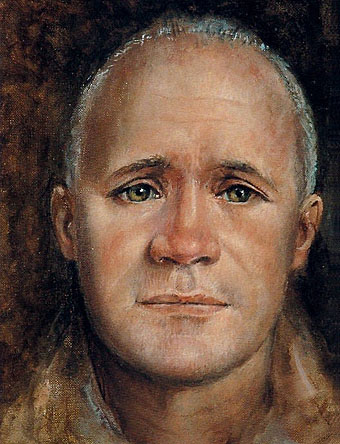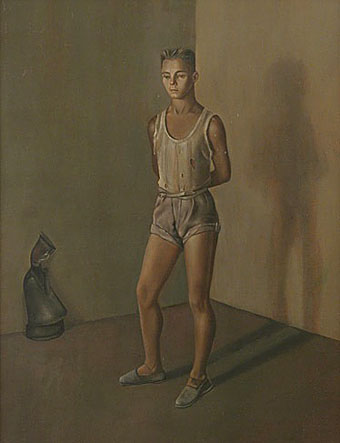
Jean Genet (1950) by Leonor Fini.
• Bibliothèque Gay looks at a series of erotic engravings made by Leonor Fini for La Galère (1947) by Jean Genet. The author reciprocated with Mademoiselle: A Letter to Leonor Fini. At the hetero end of the erotic spectrum, Tate Liverpool will be showing a series of drawings by René Magritte produced for a proposed edition of Madame Eduarda by Georges Bataille. René Magritte: The Pleasure Principle opens next month.
• George Clinton will be appearing with Nona Hendryx at the British Library on 18th June, to talk about “all things galactic”. In addition there’s a screening of John Akomfrah’s The Last Angel of History, a documentary about Afrofuturism and black science fiction. See an introduction to that here. Related: the Smithsonian’s National Museum of African American History and Culture has acquired the Parliament-Funkadelic Mothership for its collection.
• RIP Gil Scott-Heron. “Why does this colossus remain relatively unknown? Is he too political? Too uncompromising? Too angry? Too satirical? Too painful? Too playful? Too alive? Too black? Too human?” Jamie Byng in Gil Scott-Heron: poet, campaigner and America’s rough healer.

Le Fils du Maçon (1950) by Leonor Fini.
• China Miéville examines alternative histories in Brian Aldiss’s The Malacia Tapestry, David Britton’s Lord Horror and Richard Curtis’s chilling dystopia, Notting Hill.
• What happened to Rolf-Ulrich Kaiser and Gille Lettmann when the Kosmische Musik dream collapsed? Find out here.
• Mlle Ghoul interviews Will Errickson of Too Much Horror Fiction about horror paperbacks, good and bad.
• Another Surrealist woman: Claude Cahun at Strange Flowers.
• The Key of Hell: an eighteenth-century sorcery manual.
• Partitura 001: realtime sound visualisation.
• Scientific Illustration: a Tumblr.
• Cosmic Slop (1973) by Funkadelic | Cosmic Slop (1991) by Material.

I really would like to love gil scott heron, but this albatross on his first album always springs to mind:
http://www.youtube.com/watch?v=O92981dskK4
Kind of sad that someone who was a voice for the opressed should use that voice to oppress others.
Yeah, and that kind of crap’s still too common today among rappers. Generally I cut people some slack if they didn’t make a habit of it, or didn’t do it last week, neither of which would seem to apply to GSH. You can appreciate The Picture of Dorian Gray without approving of Wilde’s dismal caricature of a Jewish stage manager. Or the descriptions of black people in Joyce’s Ulysses, a particularly egregious moment in a novel devoted to tolerance, for Jews especially.